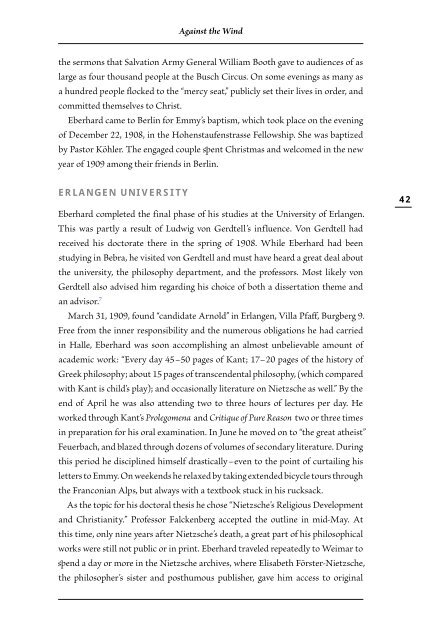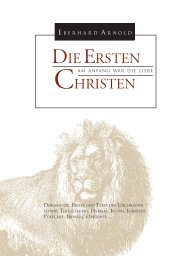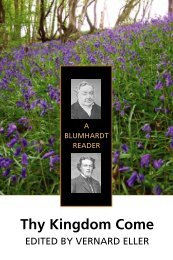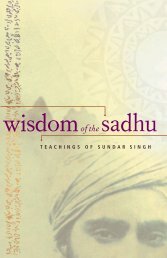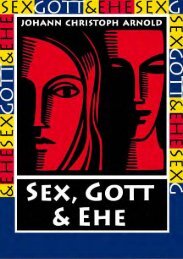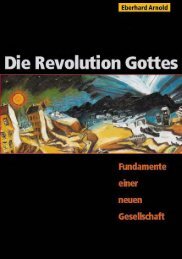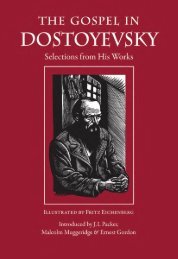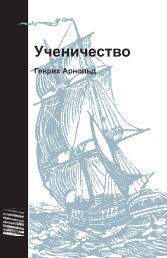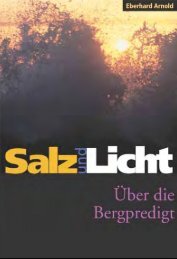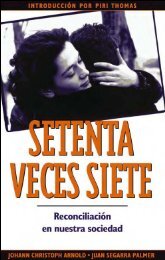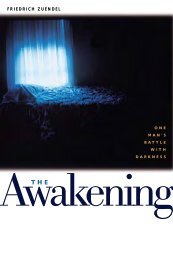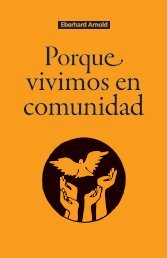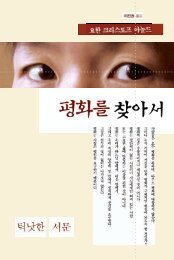Against the Wind: Eberhard Arnold and the Bruderhof - Plough
Against the Wind: Eberhard Arnold and the Bruderhof - Plough
Against the Wind: Eberhard Arnold and the Bruderhof - Plough
Create successful ePaper yourself
Turn your PDF publications into a flip-book with our unique Google optimized e-Paper software.
<strong>Against</strong> <strong>the</strong> <strong>Wind</strong><strong>the</strong> sermons that Salvation Army General William Booth gave to audiences of aslarge as four thous<strong>and</strong> people at <strong>the</strong> Busch Circus. On some evenings as many asa hundred people flocked to <strong>the</strong> “mercy seat,” publicly set <strong>the</strong>ir lives in order, <strong>and</strong>committed <strong>the</strong>mselves to Christ.<strong>Eberhard</strong> came to Berlin for Emmy’s baptism, which took place on <strong>the</strong> eveningof December 22, 1908, in <strong>the</strong> Hohenstaufenstrasse Fellowship. She was baptizedby Pastor Köhler. The engaged couple spent Christmas <strong>and</strong> welcomed in <strong>the</strong> newyear of 1909 among <strong>the</strong>ir friends in Berlin.ErlangEn univErSity<strong>Eberhard</strong> completed <strong>the</strong> final phase of his studies at <strong>the</strong> University of Erlangen.This was partly a result of Ludwig von Gerdtell’s influence. Von Gerdtell hadreceived his doctorate <strong>the</strong>re in <strong>the</strong> spring of 1908. While <strong>Eberhard</strong> had beenstudying in Bebra, he visited von Gerdtell <strong>and</strong> must have heard a great deal about<strong>the</strong> university, <strong>the</strong> philosophy department, <strong>and</strong> <strong>the</strong> professors. Most likely vonGerdtell also advised him regarding his choice of both a dissertation <strong>the</strong>me <strong>and</strong>an advisor. 7March 31, 1909, found “c<strong>and</strong>idate <strong>Arnold</strong>” in Erlangen, Villa Pfaff, Burgberg 9.Free from <strong>the</strong> inner responsibility <strong>and</strong> <strong>the</strong> numerous obligations he had carriedin Halle, <strong>Eberhard</strong> was soon accomplishing an almost unbelievable amount ofacademic work: “Every day 45–50 pages of Kant; 17–20 pages of <strong>the</strong> history ofGreek philosophy; about 15 pages of transcendental philosophy, (which comparedwith Kant is child’s play); <strong>and</strong> occasionally literature on Nietzsche as well.” By <strong>the</strong>end of April he was also attending two to three hours of lectures per day. Heworked through Kant’s Prolegomena <strong>and</strong> Critique of Pure Reason two or three timesin preparation for his oral examination. In June he moved on to “<strong>the</strong> great a<strong>the</strong>ist”Feuerbach, <strong>and</strong> blazed through dozens of volumes of secondary literature. Duringthis period he disciplined himself drastically –even to <strong>the</strong> point of curtailing hisletters to Emmy. On weekends he relaxed by taking extended bicycle tours through<strong>the</strong> Franconian Alps, but always with a textbook stuck in his rucksack.As <strong>the</strong> topic for his doctoral <strong>the</strong>sis he chose “Nietzsche’s Religious Development<strong>and</strong> Christianity.” Professor Falckenberg accepted <strong>the</strong> outline in mid-May. Atthis time, only nine years after Nietzsche’s death, a great part of his philosophicalworks were still not public or in print. <strong>Eberhard</strong> traveled repeatedly to Weimar tospend a day or more in <strong>the</strong> Nietzsche archives, where Elisabeth Förster-Nietzsche,<strong>the</strong> philosopher’s sister <strong>and</strong> posthumous publisher, gave him access to original42


